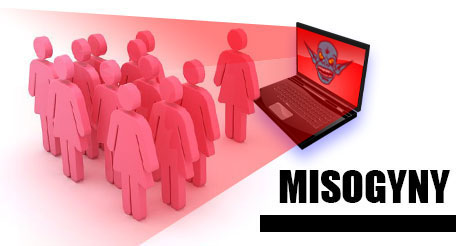 Misogyny, defined by the Oxford Dictionary as a “dislike of, contempt for, or ingrained prejudice against women” in the form of hate speech. Some in politics use hate speech, such as a racism and bigotry, to targeted minorities in a bid to become popular with those seeking a scapegoat to blame their problems on. In Australia we have seen Pauline Handson do this repeatedly, first targeting Asians and more recently Muslims. In the US Republican candidate Donald Trump has attacked Mexicans, Muslims and Black Americans (among others) and refused to speak against support from white supremacists. Racism, bigotry and hate in politics is dangerous. Like other forms of hate, misogyny too can play a role in politics.
Misogyny, defined by the Oxford Dictionary as a “dislike of, contempt for, or ingrained prejudice against women” in the form of hate speech. Some in politics use hate speech, such as a racism and bigotry, to targeted minorities in a bid to become popular with those seeking a scapegoat to blame their problems on. In Australia we have seen Pauline Handson do this repeatedly, first targeting Asians and more recently Muslims. In the US Republican candidate Donald Trump has attacked Mexicans, Muslims and Black Americans (among others) and refused to speak against support from white supremacists. Racism, bigotry and hate in politics is dangerous. Like other forms of hate, misogyny too can play a role in politics.
In the last 48 hours, recorded evidence of Donald Trump’s misogyny has shocked America. The recording from 2005 was described by Time as “using extremely vulgar language to describe women, detailing his attempt to bed a married woman and bragging that he can grope women because he is a celebrity”. Unlike other forms of hate which target a minority, misogyny attacks around half the population. That’s going to have a huge impact in an election.
Trump apologised on Facebook, but the apology itself inspired disbelief. Chris Matyszczyk commented that “Some might feel his apology was uttered with all the sincerity of a raccoon claiming innocence while holding a kitten carcass in its mouth.” A significant number of senior Republicans who previously supported Trump have now abandoned him after this latest incident.
The response in both the mainstream media and social media has been intense. On Twitter, Canadian writer Kelly Oxford shared an experience of the first assault she experienced and called on other women to do the same with millions responding.
In an opinion piece for Time, Jill Filipovic warns: “American women should be very afraid—and very angry. It’s fun and normal, Trump suggests, for men to hang out talking about grabbing women by their crotches and forcing them to kiss you. This is the root of sexual violence: The idea that women aren’t autonomous human beings with the right and ability to say yes to sexual interactions we want and no to those we don’t, but that we’re receptacles for male sexual desire, that our bodies are up for grabs (literally, in this case).”
This is where tackling the spread of misogyny, including in social media content, becomes an issue of preventing violence against women. The online abuse targeting women, which we have discussed repeatedly in the misogyny section of our website, allows such dislike, contempt and prejudice against women to be normalised. To reduce the violence we also need to reduce the misogyny. That means standing up against it.
The most famous response to misogyny is the speech in Parliament by Australia’s then Prime Minister Julia Gillard. It’s worth watching and sharing this again in light of the US situation. For our international readers, Tony Abbott later became Prime Minister himself, but was then removed by his party after a sustained period of low public support for his leadership.
We congratulate those who have stood up to say misogyny is not acceptable in a political leader. We note the growing concern in the Republican Party not only for the Presidential race, but on the potential impact on other electoral races occurring at the same time. The fact that racism, bigotry and misogyny are causing electoral concerns for politicians in the US is a positive development.
The First Amendment prevents the US congress passing any law that would restrict people’s freedom of express bigotry, racism, misogyny and other forms of hate. It does not prevent the US people taking hateful statements by candidates into account when casting their vote. Nor does it prevent voters taking account of the way the parties themselves approach issues of hate when casting their votes in other contests. The more the public stand united against hate, be it against women, ethnic minorities, religious minorities or the LGBTI community, the more political parties and governments will need to take notice.
You may also be interested in our other post today on Bigotry and Ignorance.
Help share this briefing:
